Reflective Analysis of Nursing and Professional Practice in Healthcare
VerifiedAdded on 2022/12/23
|10
|3616
|1
Report
AI Summary
This report presents a reflective analysis of a nursing professional's experiences in palliative care, stroke rehabilitation, and the challenges faced in patient interactions. It utilizes Gibbs' reflective cycle to examine a specific incident where a patient became aggressive, analyzing the feelings, evaluations, and actions taken. The report details the ethical and legal issues encountered, such as surrogate decision-making, withholding/withdrawing treatment, and medication management, highlighting the importance of evidence-based practices, teamwork, and communication skills in resolving these dilemmas. It also discusses the significance of time management, empathy, and the application of nursing standards in providing effective patient care. The analysis covers the use of neuromuscular blockers, palliative sedation, and the principles of palliative care, emphasizing the need for continuous learning and the development of professional skills to improve patient outcomes and navigate complex healthcare scenarios. The report concludes with a reflection on the importance of supportive approaches and the development of evidence-based guidelines to address ethical challenges and improve patient care within a multidisciplinary team.
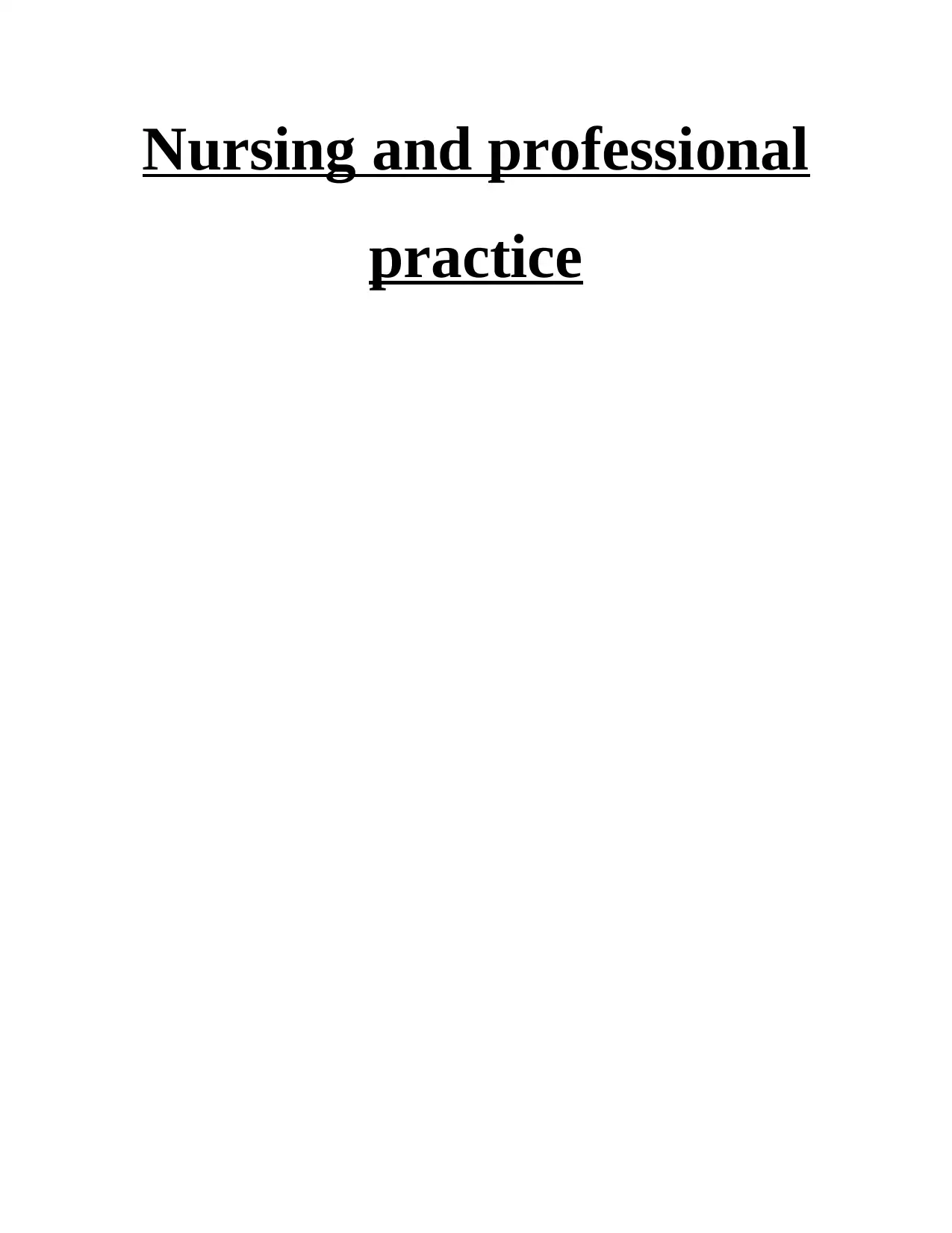
Nursing and professional
practice
practice
Paraphrase This Document
Need a fresh take? Get an instant paraphrase of this document with our AI Paraphraser
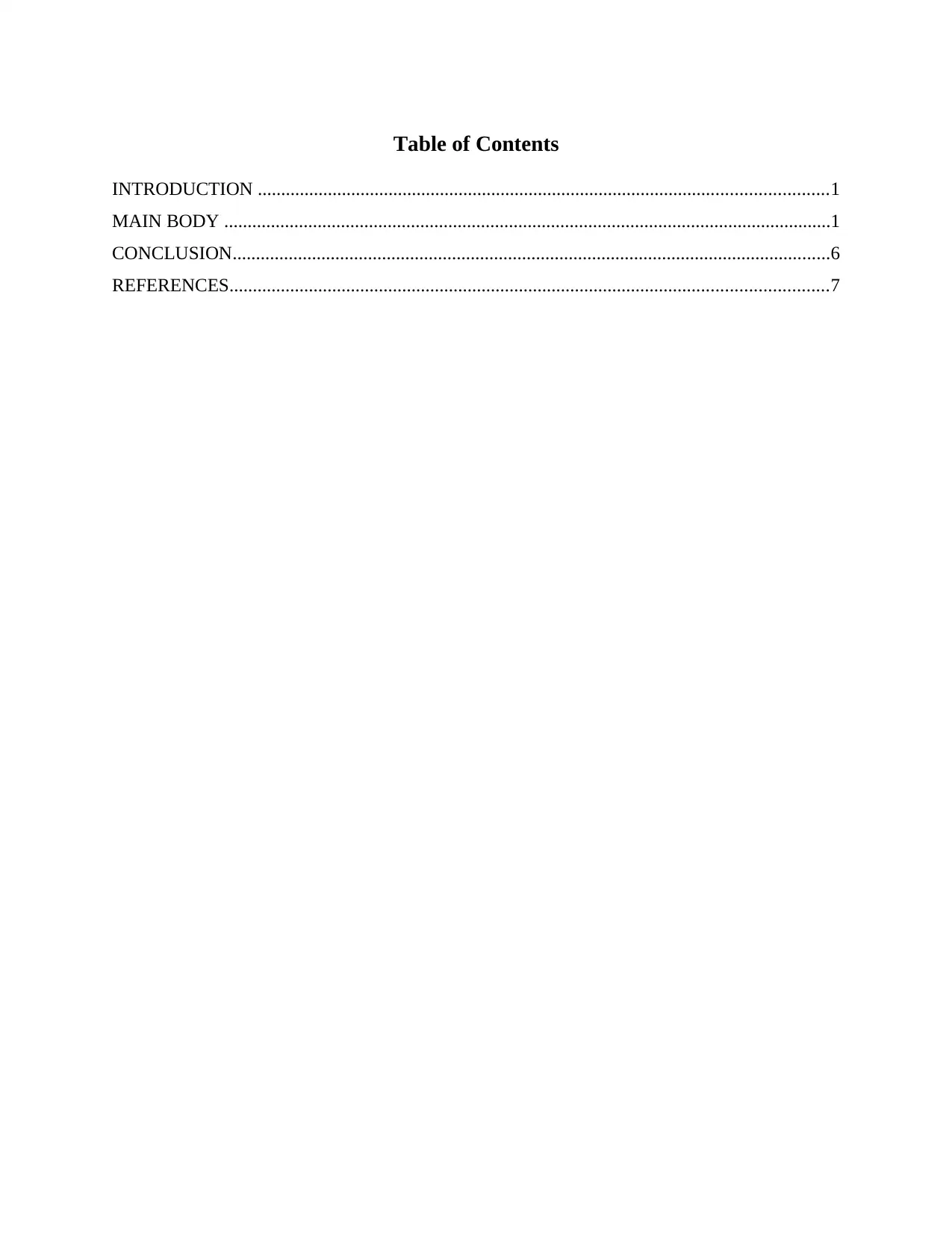
Table of Contents
INTRODUCTION ..........................................................................................................................1
MAIN BODY ..................................................................................................................................1
CONCLUSION................................................................................................................................6
REFERENCES................................................................................................................................7
INTRODUCTION ..........................................................................................................................1
MAIN BODY ..................................................................................................................................1
CONCLUSION................................................................................................................................6
REFERENCES................................................................................................................................7
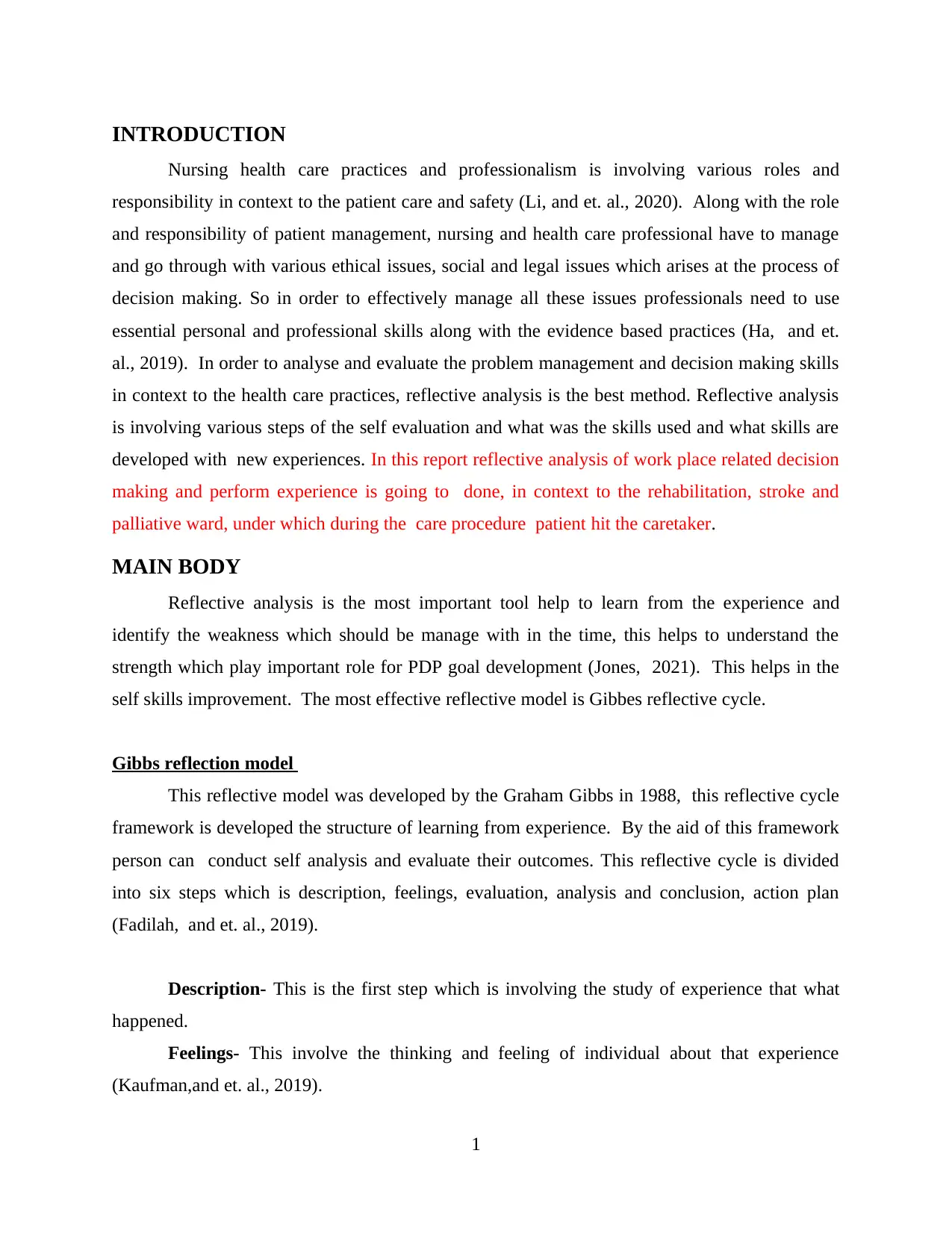
INTRODUCTION
Nursing health care practices and professionalism is involving various roles and
responsibility in context to the patient care and safety (Li, and et. al., 2020). Along with the role
and responsibility of patient management, nursing and health care professional have to manage
and go through with various ethical issues, social and legal issues which arises at the process of
decision making. So in order to effectively manage all these issues professionals need to use
essential personal and professional skills along with the evidence based practices (Ha, and et.
al., 2019). In order to analyse and evaluate the problem management and decision making skills
in context to the health care practices, reflective analysis is the best method. Reflective analysis
is involving various steps of the self evaluation and what was the skills used and what skills are
developed with new experiences. In this report reflective analysis of work place related decision
making and perform experience is going to done, in context to the rehabilitation, stroke and
palliative ward, under which during the care procedure patient hit the caretaker.
MAIN BODY
Reflective analysis is the most important tool help to learn from the experience and
identify the weakness which should be manage with in the time, this helps to understand the
strength which play important role for PDP goal development (Jones, 2021). This helps in the
self skills improvement. The most effective reflective model is Gibbes reflective cycle.
Gibbs reflection model
This reflective model was developed by the Graham Gibbs in 1988, this reflective cycle
framework is developed the structure of learning from experience. By the aid of this framework
person can conduct self analysis and evaluate their outcomes. This reflective cycle is divided
into six steps which is description, feelings, evaluation, analysis and conclusion, action plan
(Fadilah, and et. al., 2019).
Description- This is the first step which is involving the study of experience that what
happened.
Feelings- This involve the thinking and feeling of individual about that experience
(Kaufman,and et. al., 2019).
1
Nursing health care practices and professionalism is involving various roles and
responsibility in context to the patient care and safety (Li, and et. al., 2020). Along with the role
and responsibility of patient management, nursing and health care professional have to manage
and go through with various ethical issues, social and legal issues which arises at the process of
decision making. So in order to effectively manage all these issues professionals need to use
essential personal and professional skills along with the evidence based practices (Ha, and et.
al., 2019). In order to analyse and evaluate the problem management and decision making skills
in context to the health care practices, reflective analysis is the best method. Reflective analysis
is involving various steps of the self evaluation and what was the skills used and what skills are
developed with new experiences. In this report reflective analysis of work place related decision
making and perform experience is going to done, in context to the rehabilitation, stroke and
palliative ward, under which during the care procedure patient hit the caretaker.
MAIN BODY
Reflective analysis is the most important tool help to learn from the experience and
identify the weakness which should be manage with in the time, this helps to understand the
strength which play important role for PDP goal development (Jones, 2021). This helps in the
self skills improvement. The most effective reflective model is Gibbes reflective cycle.
Gibbs reflection model
This reflective model was developed by the Graham Gibbs in 1988, this reflective cycle
framework is developed the structure of learning from experience. By the aid of this framework
person can conduct self analysis and evaluate their outcomes. This reflective cycle is divided
into six steps which is description, feelings, evaluation, analysis and conclusion, action plan
(Fadilah, and et. al., 2019).
Description- This is the first step which is involving the study of experience that what
happened.
Feelings- This involve the thinking and feeling of individual about that experience
(Kaufman,and et. al., 2019).
1
⊘ This is a preview!⊘
Do you want full access?
Subscribe today to unlock all pages.

Trusted by 1+ million students worldwide
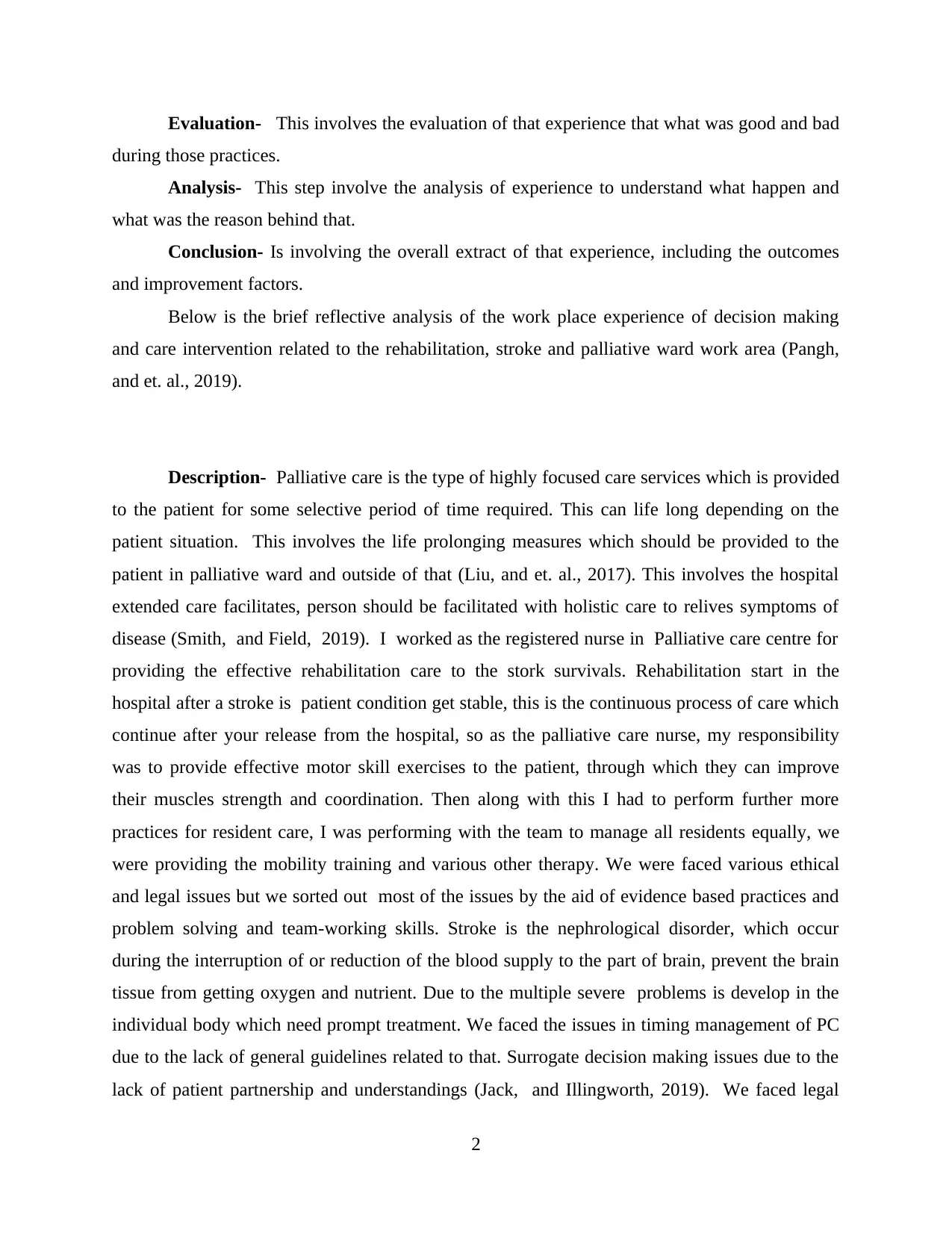
Evaluation- This involves the evaluation of that experience that what was good and bad
during those practices.
Analysis- This step involve the analysis of experience to understand what happen and
what was the reason behind that.
Conclusion- Is involving the overall extract of that experience, including the outcomes
and improvement factors.
Below is the brief reflective analysis of the work place experience of decision making
and care intervention related to the rehabilitation, stroke and palliative ward work area (Pangh,
and et. al., 2019).
Description- Palliative care is the type of highly focused care services which is provided
to the patient for some selective period of time required. This can life long depending on the
patient situation. This involves the life prolonging measures which should be provided to the
patient in palliative ward and outside of that (Liu, and et. al., 2017). This involves the hospital
extended care facilitates, person should be facilitated with holistic care to relives symptoms of
disease (Smith, and Field, 2019). I worked as the registered nurse in Palliative care centre for
providing the effective rehabilitation care to the stork survivals. Rehabilitation start in the
hospital after a stroke is patient condition get stable, this is the continuous process of care which
continue after your release from the hospital, so as the palliative care nurse, my responsibility
was to provide effective motor skill exercises to the patient, through which they can improve
their muscles strength and coordination. Then along with this I had to perform further more
practices for resident care, I was performing with the team to manage all residents equally, we
were providing the mobility training and various other therapy. We were faced various ethical
and legal issues but we sorted out most of the issues by the aid of evidence based practices and
problem solving and team-working skills. Stroke is the nephrological disorder, which occur
during the interruption of or reduction of the blood supply to the part of brain, prevent the brain
tissue from getting oxygen and nutrient. Due to the multiple severe problems is develop in the
individual body which need prompt treatment. We faced the issues in timing management of PC
due to the lack of general guidelines related to that. Surrogate decision making issues due to the
lack of patient partnership and understandings (Jack, and Illingworth, 2019). We faced legal
2
during those practices.
Analysis- This step involve the analysis of experience to understand what happen and
what was the reason behind that.
Conclusion- Is involving the overall extract of that experience, including the outcomes
and improvement factors.
Below is the brief reflective analysis of the work place experience of decision making
and care intervention related to the rehabilitation, stroke and palliative ward work area (Pangh,
and et. al., 2019).
Description- Palliative care is the type of highly focused care services which is provided
to the patient for some selective period of time required. This can life long depending on the
patient situation. This involves the life prolonging measures which should be provided to the
patient in palliative ward and outside of that (Liu, and et. al., 2017). This involves the hospital
extended care facilitates, person should be facilitated with holistic care to relives symptoms of
disease (Smith, and Field, 2019). I worked as the registered nurse in Palliative care centre for
providing the effective rehabilitation care to the stork survivals. Rehabilitation start in the
hospital after a stroke is patient condition get stable, this is the continuous process of care which
continue after your release from the hospital, so as the palliative care nurse, my responsibility
was to provide effective motor skill exercises to the patient, through which they can improve
their muscles strength and coordination. Then along with this I had to perform further more
practices for resident care, I was performing with the team to manage all residents equally, we
were providing the mobility training and various other therapy. We were faced various ethical
and legal issues but we sorted out most of the issues by the aid of evidence based practices and
problem solving and team-working skills. Stroke is the nephrological disorder, which occur
during the interruption of or reduction of the blood supply to the part of brain, prevent the brain
tissue from getting oxygen and nutrient. Due to the multiple severe problems is develop in the
individual body which need prompt treatment. We faced the issues in timing management of PC
due to the lack of general guidelines related to that. Surrogate decision making issues due to the
lack of patient partnership and understandings (Jack, and Illingworth, 2019). We faced legal
2
Paraphrase This Document
Need a fresh take? Get an instant paraphrase of this document with our AI Paraphraser
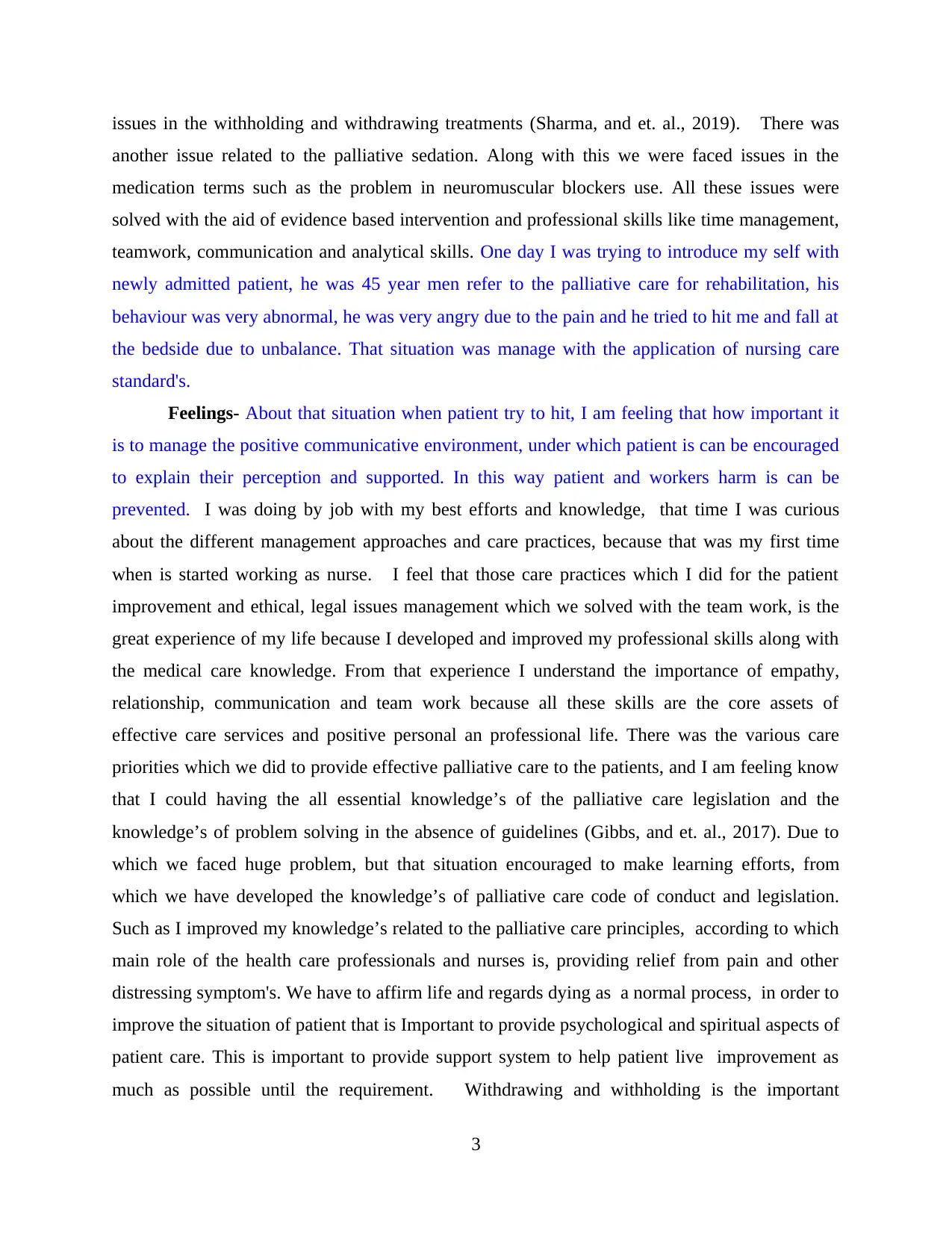
issues in the withholding and withdrawing treatments (Sharma, and et. al., 2019). There was
another issue related to the palliative sedation. Along with this we were faced issues in the
medication terms such as the problem in neuromuscular blockers use. All these issues were
solved with the aid of evidence based intervention and professional skills like time management,
teamwork, communication and analytical skills. One day I was trying to introduce my self with
newly admitted patient, he was 45 year men refer to the palliative care for rehabilitation, his
behaviour was very abnormal, he was very angry due to the pain and he tried to hit me and fall at
the bedside due to unbalance. That situation was manage with the application of nursing care
standard's.
Feelings- About that situation when patient try to hit, I am feeling that how important it
is to manage the positive communicative environment, under which patient is can be encouraged
to explain their perception and supported. In this way patient and workers harm is can be
prevented. I was doing by job with my best efforts and knowledge, that time I was curious
about the different management approaches and care practices, because that was my first time
when is started working as nurse. I feel that those care practices which I did for the patient
improvement and ethical, legal issues management which we solved with the team work, is the
great experience of my life because I developed and improved my professional skills along with
the medical care knowledge. From that experience I understand the importance of empathy,
relationship, communication and team work because all these skills are the core assets of
effective care services and positive personal an professional life. There was the various care
priorities which we did to provide effective palliative care to the patients, and I am feeling know
that I could having the all essential knowledge’s of the palliative care legislation and the
knowledge’s of problem solving in the absence of guidelines (Gibbs, and et. al., 2017). Due to
which we faced huge problem, but that situation encouraged to make learning efforts, from
which we have developed the knowledge’s of palliative care code of conduct and legislation.
Such as I improved my knowledge’s related to the palliative care principles, according to which
main role of the health care professionals and nurses is, providing relief from pain and other
distressing symptom's. We have to affirm life and regards dying as a normal process, in order to
improve the situation of patient that is Important to provide psychological and spiritual aspects of
patient care. This is important to provide support system to help patient live improvement as
much as possible until the requirement. Withdrawing and withholding is the important
3
another issue related to the palliative sedation. Along with this we were faced issues in the
medication terms such as the problem in neuromuscular blockers use. All these issues were
solved with the aid of evidence based intervention and professional skills like time management,
teamwork, communication and analytical skills. One day I was trying to introduce my self with
newly admitted patient, he was 45 year men refer to the palliative care for rehabilitation, his
behaviour was very abnormal, he was very angry due to the pain and he tried to hit me and fall at
the bedside due to unbalance. That situation was manage with the application of nursing care
standard's.
Feelings- About that situation when patient try to hit, I am feeling that how important it
is to manage the positive communicative environment, under which patient is can be encouraged
to explain their perception and supported. In this way patient and workers harm is can be
prevented. I was doing by job with my best efforts and knowledge, that time I was curious
about the different management approaches and care practices, because that was my first time
when is started working as nurse. I feel that those care practices which I did for the patient
improvement and ethical, legal issues management which we solved with the team work, is the
great experience of my life because I developed and improved my professional skills along with
the medical care knowledge. From that experience I understand the importance of empathy,
relationship, communication and team work because all these skills are the core assets of
effective care services and positive personal an professional life. There was the various care
priorities which we did to provide effective palliative care to the patients, and I am feeling know
that I could having the all essential knowledge’s of the palliative care legislation and the
knowledge’s of problem solving in the absence of guidelines (Gibbs, and et. al., 2017). Due to
which we faced huge problem, but that situation encouraged to make learning efforts, from
which we have developed the knowledge’s of palliative care code of conduct and legislation.
Such as I improved my knowledge’s related to the palliative care principles, according to which
main role of the health care professionals and nurses is, providing relief from pain and other
distressing symptom's. We have to affirm life and regards dying as a normal process, in order to
improve the situation of patient that is Important to provide psychological and spiritual aspects of
patient care. This is important to provide support system to help patient live improvement as
much as possible until the requirement. Withdrawing and withholding is the important
3
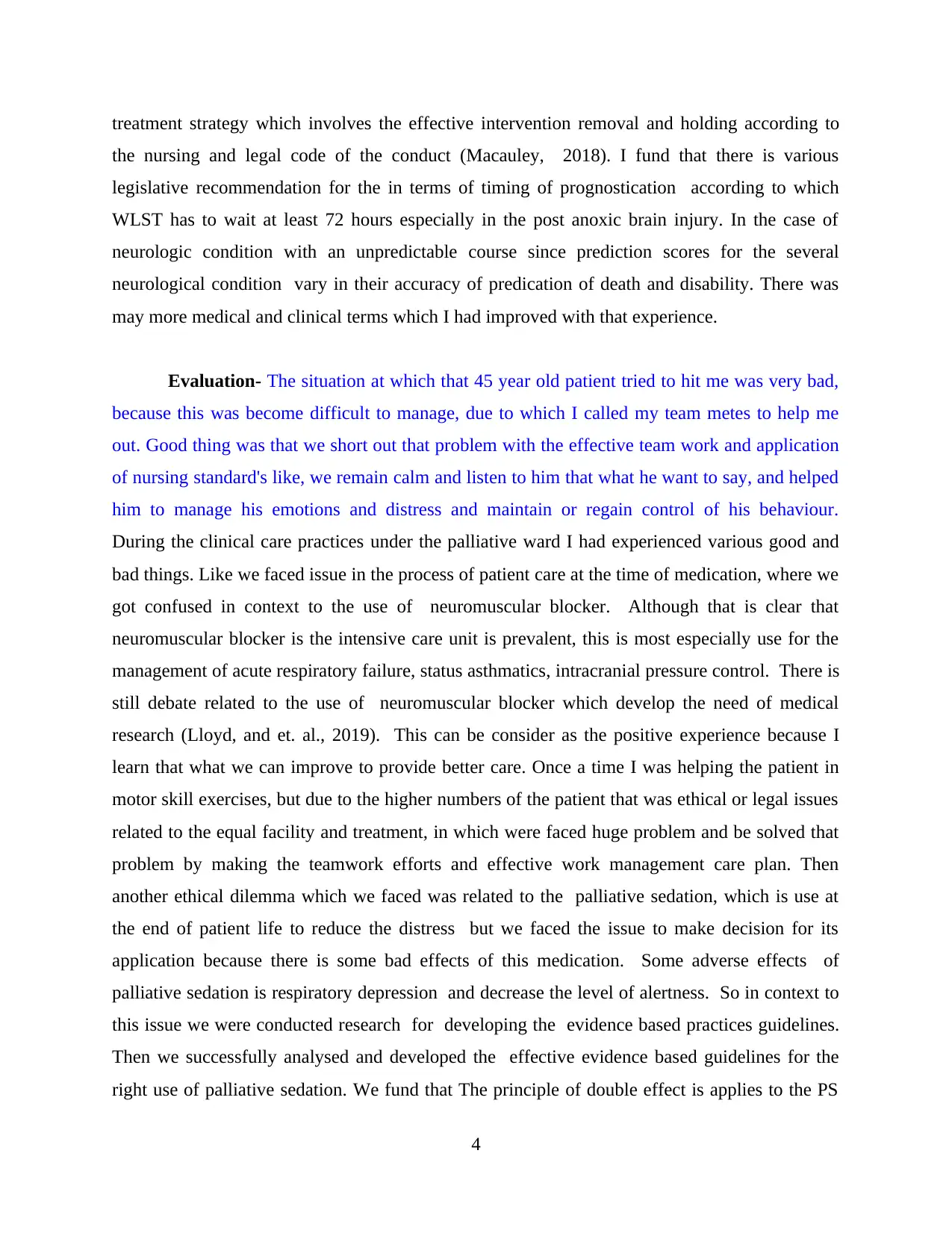
treatment strategy which involves the effective intervention removal and holding according to
the nursing and legal code of the conduct (Macauley, 2018). I fund that there is various
legislative recommendation for the in terms of timing of prognostication according to which
WLST has to wait at least 72 hours especially in the post anoxic brain injury. In the case of
neurologic condition with an unpredictable course since prediction scores for the several
neurological condition vary in their accuracy of predication of death and disability. There was
may more medical and clinical terms which I had improved with that experience.
Evaluation- The situation at which that 45 year old patient tried to hit me was very bad,
because this was become difficult to manage, due to which I called my team metes to help me
out. Good thing was that we short out that problem with the effective team work and application
of nursing standard's like, we remain calm and listen to him that what he want to say, and helped
him to manage his emotions and distress and maintain or regain control of his behaviour.
During the clinical care practices under the palliative ward I had experienced various good and
bad things. Like we faced issue in the process of patient care at the time of medication, where we
got confused in context to the use of neuromuscular blocker. Although that is clear that
neuromuscular blocker is the intensive care unit is prevalent, this is most especially use for the
management of acute respiratory failure, status asthmatics, intracranial pressure control. There is
still debate related to the use of neuromuscular blocker which develop the need of medical
research (Lloyd, and et. al., 2019). This can be consider as the positive experience because I
learn that what we can improve to provide better care. Once a time I was helping the patient in
motor skill exercises, but due to the higher numbers of the patient that was ethical or legal issues
related to the equal facility and treatment, in which were faced huge problem and be solved that
problem by making the teamwork efforts and effective work management care plan. Then
another ethical dilemma which we faced was related to the palliative sedation, which is use at
the end of patient life to reduce the distress but we faced the issue to make decision for its
application because there is some bad effects of this medication. Some adverse effects of
palliative sedation is respiratory depression and decrease the level of alertness. So in context to
this issue we were conducted research for developing the evidence based practices guidelines.
Then we successfully analysed and developed the effective evidence based guidelines for the
right use of palliative sedation. We fund that The principle of double effect is applies to the PS
4
the nursing and legal code of the conduct (Macauley, 2018). I fund that there is various
legislative recommendation for the in terms of timing of prognostication according to which
WLST has to wait at least 72 hours especially in the post anoxic brain injury. In the case of
neurologic condition with an unpredictable course since prediction scores for the several
neurological condition vary in their accuracy of predication of death and disability. There was
may more medical and clinical terms which I had improved with that experience.
Evaluation- The situation at which that 45 year old patient tried to hit me was very bad,
because this was become difficult to manage, due to which I called my team metes to help me
out. Good thing was that we short out that problem with the effective team work and application
of nursing standard's like, we remain calm and listen to him that what he want to say, and helped
him to manage his emotions and distress and maintain or regain control of his behaviour.
During the clinical care practices under the palliative ward I had experienced various good and
bad things. Like we faced issue in the process of patient care at the time of medication, where we
got confused in context to the use of neuromuscular blocker. Although that is clear that
neuromuscular blocker is the intensive care unit is prevalent, this is most especially use for the
management of acute respiratory failure, status asthmatics, intracranial pressure control. There is
still debate related to the use of neuromuscular blocker which develop the need of medical
research (Lloyd, and et. al., 2019). This can be consider as the positive experience because I
learn that what we can improve to provide better care. Once a time I was helping the patient in
motor skill exercises, but due to the higher numbers of the patient that was ethical or legal issues
related to the equal facility and treatment, in which were faced huge problem and be solved that
problem by making the teamwork efforts and effective work management care plan. Then
another ethical dilemma which we faced was related to the palliative sedation, which is use at
the end of patient life to reduce the distress but we faced the issue to make decision for its
application because there is some bad effects of this medication. Some adverse effects of
palliative sedation is respiratory depression and decrease the level of alertness. So in context to
this issue we were conducted research for developing the evidence based practices guidelines.
Then we successfully analysed and developed the effective evidence based guidelines for the
right use of palliative sedation. We fund that The principle of double effect is applies to the PS
4
⊘ This is a preview!⊘
Do you want full access?
Subscribe today to unlock all pages.

Trusted by 1+ million students worldwide
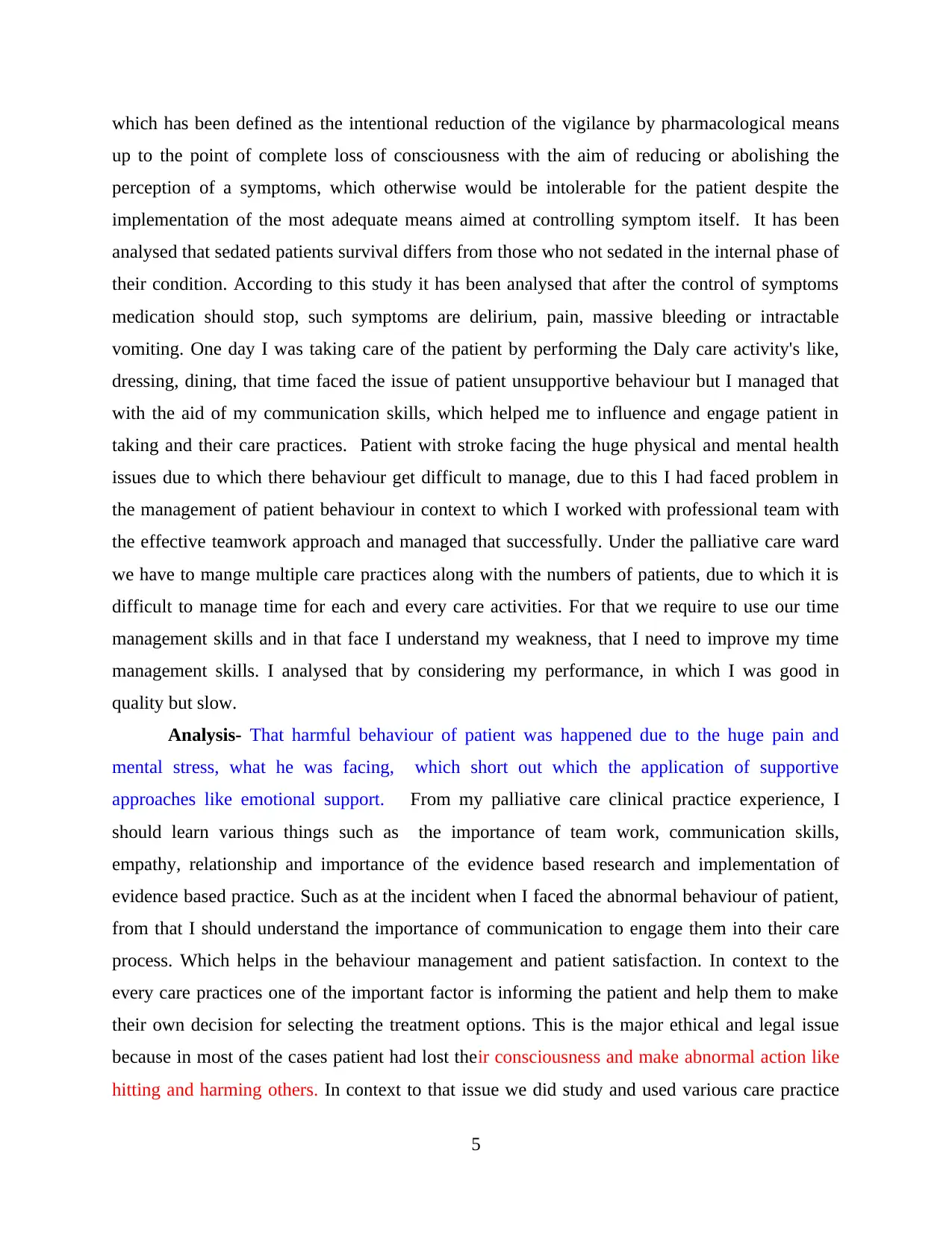
which has been defined as the intentional reduction of the vigilance by pharmacological means
up to the point of complete loss of consciousness with the aim of reducing or abolishing the
perception of a symptoms, which otherwise would be intolerable for the patient despite the
implementation of the most adequate means aimed at controlling symptom itself. It has been
analysed that sedated patients survival differs from those who not sedated in the internal phase of
their condition. According to this study it has been analysed that after the control of symptoms
medication should stop, such symptoms are delirium, pain, massive bleeding or intractable
vomiting. One day I was taking care of the patient by performing the Daly care activity's like,
dressing, dining, that time faced the issue of patient unsupportive behaviour but I managed that
with the aid of my communication skills, which helped me to influence and engage patient in
taking and their care practices. Patient with stroke facing the huge physical and mental health
issues due to which there behaviour get difficult to manage, due to this I had faced problem in
the management of patient behaviour in context to which I worked with professional team with
the effective teamwork approach and managed that successfully. Under the palliative care ward
we have to mange multiple care practices along with the numbers of patients, due to which it is
difficult to manage time for each and every care activities. For that we require to use our time
management skills and in that face I understand my weakness, that I need to improve my time
management skills. I analysed that by considering my performance, in which I was good in
quality but slow.
Analysis- That harmful behaviour of patient was happened due to the huge pain and
mental stress, what he was facing, which short out which the application of supportive
approaches like emotional support. From my palliative care clinical practice experience, I
should learn various things such as the importance of team work, communication skills,
empathy, relationship and importance of the evidence based research and implementation of
evidence based practice. Such as at the incident when I faced the abnormal behaviour of patient,
from that I should understand the importance of communication to engage them into their care
process. Which helps in the behaviour management and patient satisfaction. In context to the
every care practices one of the important factor is informing the patient and help them to make
their own decision for selecting the treatment options. This is the major ethical and legal issue
because in most of the cases patient had lost their consciousness and make abnormal action like
hitting and harming others. In context to that issue we did study and used various care practice
5
up to the point of complete loss of consciousness with the aim of reducing or abolishing the
perception of a symptoms, which otherwise would be intolerable for the patient despite the
implementation of the most adequate means aimed at controlling symptom itself. It has been
analysed that sedated patients survival differs from those who not sedated in the internal phase of
their condition. According to this study it has been analysed that after the control of symptoms
medication should stop, such symptoms are delirium, pain, massive bleeding or intractable
vomiting. One day I was taking care of the patient by performing the Daly care activity's like,
dressing, dining, that time faced the issue of patient unsupportive behaviour but I managed that
with the aid of my communication skills, which helped me to influence and engage patient in
taking and their care practices. Patient with stroke facing the huge physical and mental health
issues due to which there behaviour get difficult to manage, due to this I had faced problem in
the management of patient behaviour in context to which I worked with professional team with
the effective teamwork approach and managed that successfully. Under the palliative care ward
we have to mange multiple care practices along with the numbers of patients, due to which it is
difficult to manage time for each and every care activities. For that we require to use our time
management skills and in that face I understand my weakness, that I need to improve my time
management skills. I analysed that by considering my performance, in which I was good in
quality but slow.
Analysis- That harmful behaviour of patient was happened due to the huge pain and
mental stress, what he was facing, which short out which the application of supportive
approaches like emotional support. From my palliative care clinical practice experience, I
should learn various things such as the importance of team work, communication skills,
empathy, relationship and importance of the evidence based research and implementation of
evidence based practice. Such as at the incident when I faced the abnormal behaviour of patient,
from that I should understand the importance of communication to engage them into their care
process. Which helps in the behaviour management and patient satisfaction. In context to the
every care practices one of the important factor is informing the patient and help them to make
their own decision for selecting the treatment options. This is the major ethical and legal issue
because in most of the cases patient had lost their consciousness and make abnormal action like
hitting and harming others. In context to that issue we did study and used various care practice
5
Paraphrase This Document
Need a fresh take? Get an instant paraphrase of this document with our AI Paraphraser
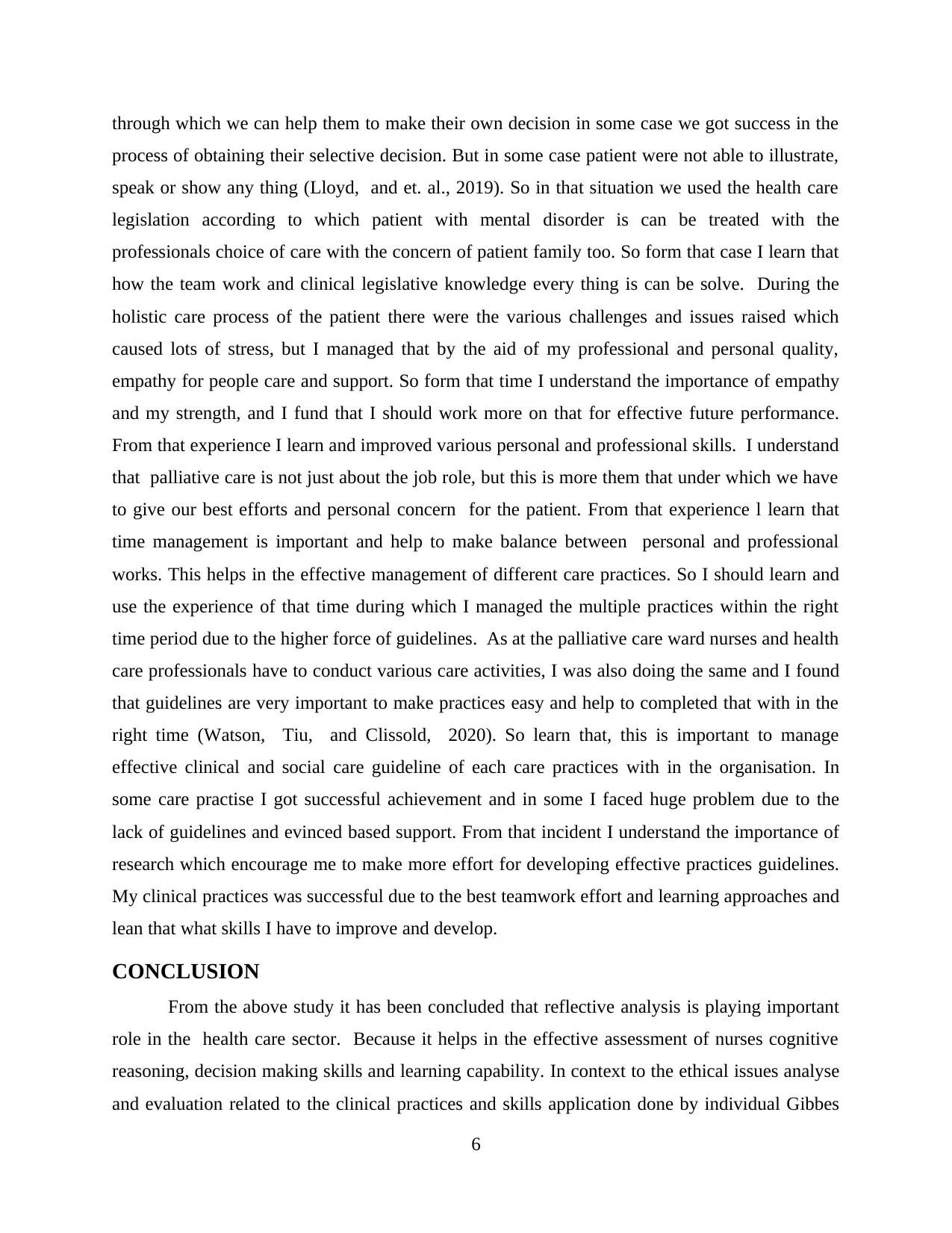
through which we can help them to make their own decision in some case we got success in the
process of obtaining their selective decision. But in some case patient were not able to illustrate,
speak or show any thing (Lloyd, and et. al., 2019). So in that situation we used the health care
legislation according to which patient with mental disorder is can be treated with the
professionals choice of care with the concern of patient family too. So form that case I learn that
how the team work and clinical legislative knowledge every thing is can be solve. During the
holistic care process of the patient there were the various challenges and issues raised which
caused lots of stress, but I managed that by the aid of my professional and personal quality,
empathy for people care and support. So form that time I understand the importance of empathy
and my strength, and I fund that I should work more on that for effective future performance.
From that experience I learn and improved various personal and professional skills. I understand
that palliative care is not just about the job role, but this is more them that under which we have
to give our best efforts and personal concern for the patient. From that experience l learn that
time management is important and help to make balance between personal and professional
works. This helps in the effective management of different care practices. So I should learn and
use the experience of that time during which I managed the multiple practices within the right
time period due to the higher force of guidelines. As at the palliative care ward nurses and health
care professionals have to conduct various care activities, I was also doing the same and I found
that guidelines are very important to make practices easy and help to completed that with in the
right time (Watson, Tiu, and Clissold, 2020). So learn that, this is important to manage
effective clinical and social care guideline of each care practices with in the organisation. In
some care practise I got successful achievement and in some I faced huge problem due to the
lack of guidelines and evinced based support. From that incident I understand the importance of
research which encourage me to make more effort for developing effective practices guidelines.
My clinical practices was successful due to the best teamwork effort and learning approaches and
lean that what skills I have to improve and develop.
CONCLUSION
From the above study it has been concluded that reflective analysis is playing important
role in the health care sector. Because it helps in the effective assessment of nurses cognitive
reasoning, decision making skills and learning capability. In context to the ethical issues analyse
and evaluation related to the clinical practices and skills application done by individual Gibbes
6
process of obtaining their selective decision. But in some case patient were not able to illustrate,
speak or show any thing (Lloyd, and et. al., 2019). So in that situation we used the health care
legislation according to which patient with mental disorder is can be treated with the
professionals choice of care with the concern of patient family too. So form that case I learn that
how the team work and clinical legislative knowledge every thing is can be solve. During the
holistic care process of the patient there were the various challenges and issues raised which
caused lots of stress, but I managed that by the aid of my professional and personal quality,
empathy for people care and support. So form that time I understand the importance of empathy
and my strength, and I fund that I should work more on that for effective future performance.
From that experience I learn and improved various personal and professional skills. I understand
that palliative care is not just about the job role, but this is more them that under which we have
to give our best efforts and personal concern for the patient. From that experience l learn that
time management is important and help to make balance between personal and professional
works. This helps in the effective management of different care practices. So I should learn and
use the experience of that time during which I managed the multiple practices within the right
time period due to the higher force of guidelines. As at the palliative care ward nurses and health
care professionals have to conduct various care activities, I was also doing the same and I found
that guidelines are very important to make practices easy and help to completed that with in the
right time (Watson, Tiu, and Clissold, 2020). So learn that, this is important to manage
effective clinical and social care guideline of each care practices with in the organisation. In
some care practise I got successful achievement and in some I faced huge problem due to the
lack of guidelines and evinced based support. From that incident I understand the importance of
research which encourage me to make more effort for developing effective practices guidelines.
My clinical practices was successful due to the best teamwork effort and learning approaches and
lean that what skills I have to improve and develop.
CONCLUSION
From the above study it has been concluded that reflective analysis is playing important
role in the health care sector. Because it helps in the effective assessment of nurses cognitive
reasoning, decision making skills and learning capability. In context to the ethical issues analyse
and evaluation related to the clinical practices and skills application done by individual Gibbes
6
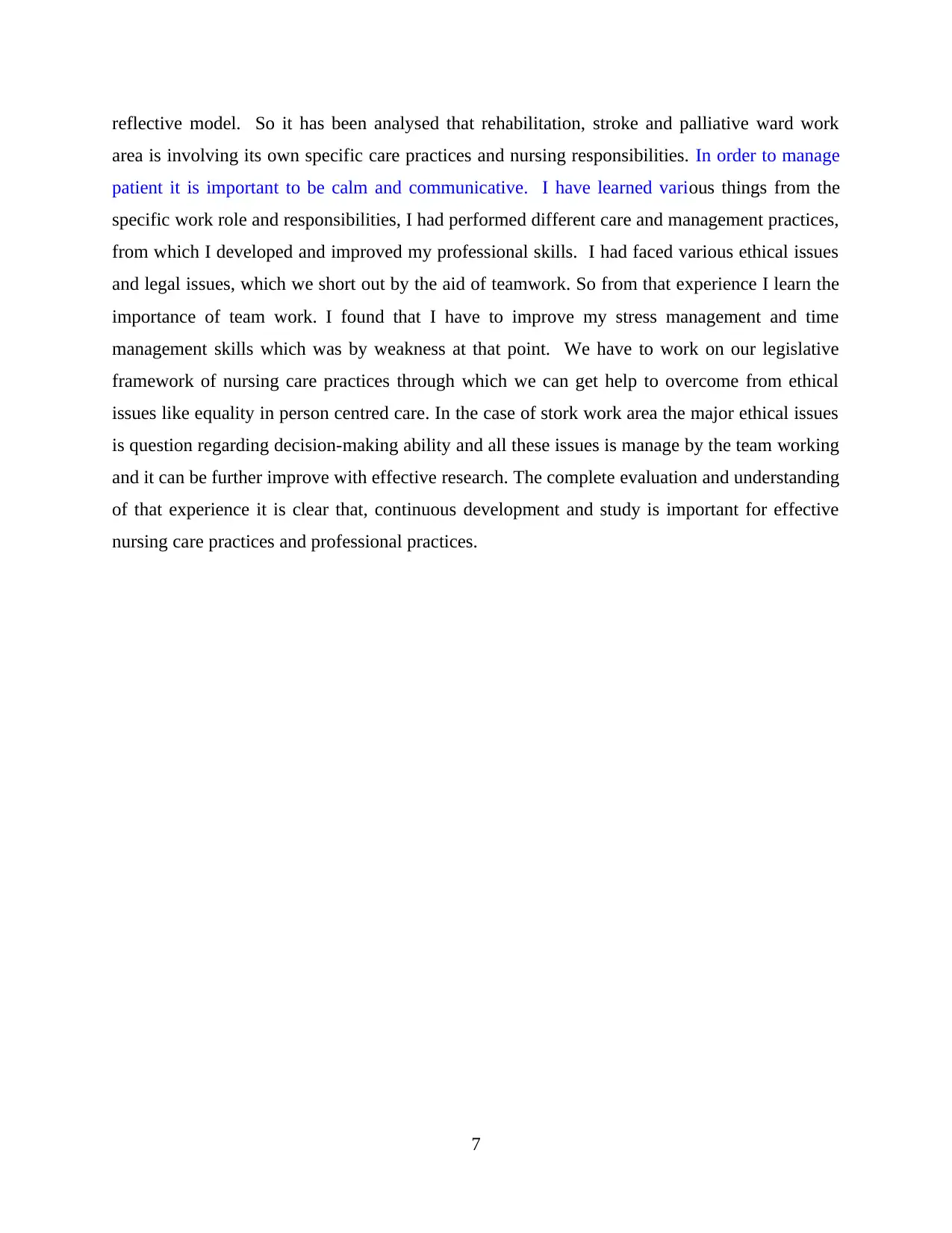
reflective model. So it has been analysed that rehabilitation, stroke and palliative ward work
area is involving its own specific care practices and nursing responsibilities. In order to manage
patient it is important to be calm and communicative. I have learned various things from the
specific work role and responsibilities, I had performed different care and management practices,
from which I developed and improved my professional skills. I had faced various ethical issues
and legal issues, which we short out by the aid of teamwork. So from that experience I learn the
importance of team work. I found that I have to improve my stress management and time
management skills which was by weakness at that point. We have to work on our legislative
framework of nursing care practices through which we can get help to overcome from ethical
issues like equality in person centred care. In the case of stork work area the major ethical issues
is question regarding decision-making ability and all these issues is manage by the team working
and it can be further improve with effective research. The complete evaluation and understanding
of that experience it is clear that, continuous development and study is important for effective
nursing care practices and professional practices.
7
area is involving its own specific care practices and nursing responsibilities. In order to manage
patient it is important to be calm and communicative. I have learned various things from the
specific work role and responsibilities, I had performed different care and management practices,
from which I developed and improved my professional skills. I had faced various ethical issues
and legal issues, which we short out by the aid of teamwork. So from that experience I learn the
importance of team work. I found that I have to improve my stress management and time
management skills which was by weakness at that point. We have to work on our legislative
framework of nursing care practices through which we can get help to overcome from ethical
issues like equality in person centred care. In the case of stork work area the major ethical issues
is question regarding decision-making ability and all these issues is manage by the team working
and it can be further improve with effective research. The complete evaluation and understanding
of that experience it is clear that, continuous development and study is important for effective
nursing care practices and professional practices.
7
⊘ This is a preview!⊘
Do you want full access?
Subscribe today to unlock all pages.

Trusted by 1+ million students worldwide
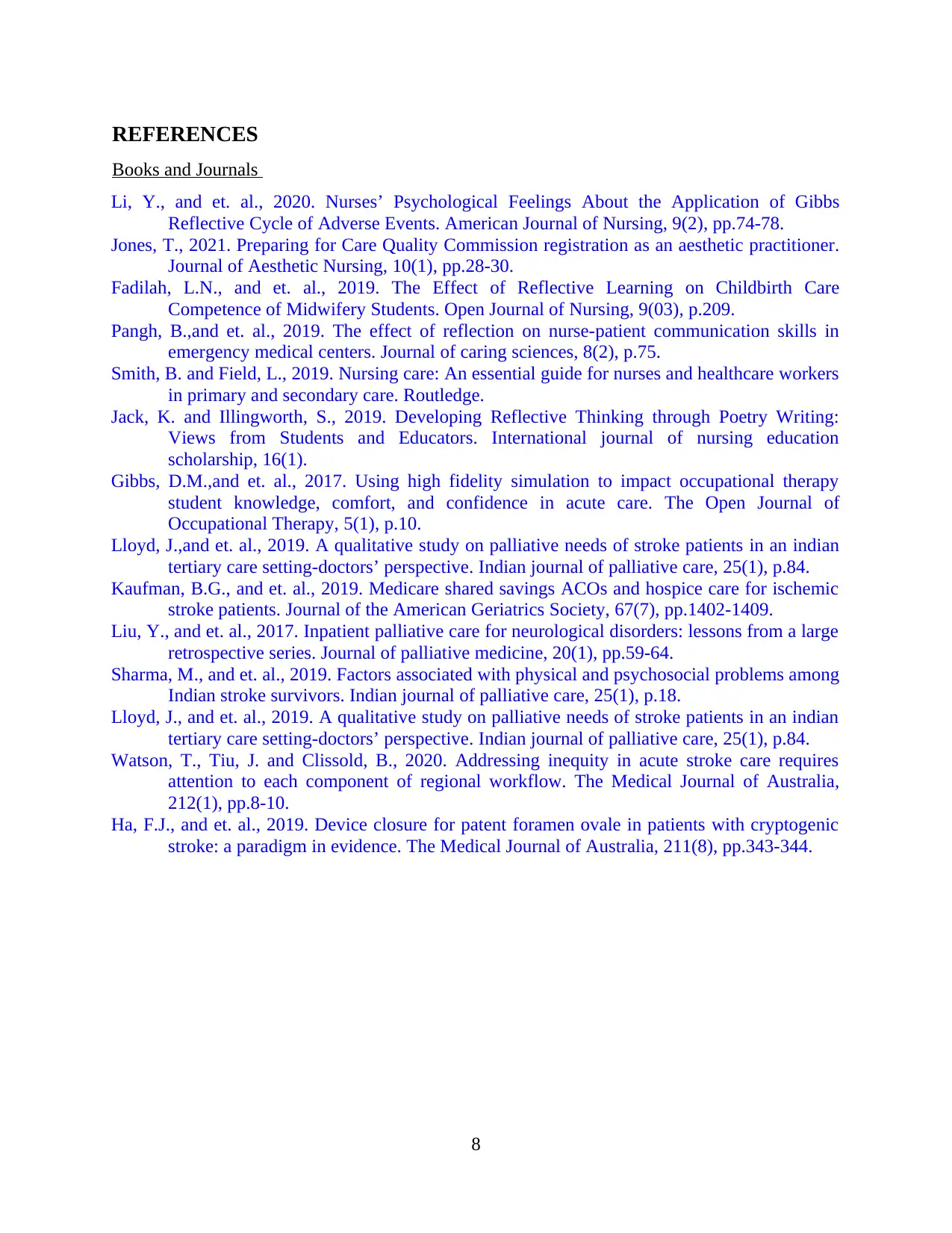
REFERENCES
Books and Journals
Li, Y., and et. al., 2020. Nurses’ Psychological Feelings About the Application of Gibbs
Reflective Cycle of Adverse Events. American Journal of Nursing, 9(2), pp.74-78.
Jones, T., 2021. Preparing for Care Quality Commission registration as an aesthetic practitioner.
Journal of Aesthetic Nursing, 10(1), pp.28-30.
Fadilah, L.N., and et. al., 2019. The Effect of Reflective Learning on Childbirth Care
Competence of Midwifery Students. Open Journal of Nursing, 9(03), p.209.
Pangh, B.,and et. al., 2019. The effect of reflection on nurse-patient communication skills in
emergency medical centers. Journal of caring sciences, 8(2), p.75.
Smith, B. and Field, L., 2019. Nursing care: An essential guide for nurses and healthcare workers
in primary and secondary care. Routledge.
Jack, K. and Illingworth, S., 2019. Developing Reflective Thinking through Poetry Writing:
Views from Students and Educators. International journal of nursing education
scholarship, 16(1).
Gibbs, D.M.,and et. al., 2017. Using high fidelity simulation to impact occupational therapy
student knowledge, comfort, and confidence in acute care. The Open Journal of
Occupational Therapy, 5(1), p.10.
Lloyd, J.,and et. al., 2019. A qualitative study on palliative needs of stroke patients in an indian
tertiary care setting-doctors’ perspective. Indian journal of palliative care, 25(1), p.84.
Kaufman, B.G., and et. al., 2019. Medicare shared savings ACOs and hospice care for ischemic
stroke patients. Journal of the American Geriatrics Society, 67(7), pp.1402-1409.
Liu, Y., and et. al., 2017. Inpatient palliative care for neurological disorders: lessons from a large
retrospective series. Journal of palliative medicine, 20(1), pp.59-64.
Sharma, M., and et. al., 2019. Factors associated with physical and psychosocial problems among
Indian stroke survivors. Indian journal of palliative care, 25(1), p.18.
Lloyd, J., and et. al., 2019. A qualitative study on palliative needs of stroke patients in an indian
tertiary care setting-doctors’ perspective. Indian journal of palliative care, 25(1), p.84.
Watson, T., Tiu, J. and Clissold, B., 2020. Addressing inequity in acute stroke care requires
attention to each component of regional workflow. The Medical Journal of Australia,
212(1), pp.8-10.
Ha, F.J., and et. al., 2019. Device closure for patent foramen ovale in patients with cryptogenic
stroke: a paradigm in evidence. The Medical Journal of Australia, 211(8), pp.343-344.
8
Books and Journals
Li, Y., and et. al., 2020. Nurses’ Psychological Feelings About the Application of Gibbs
Reflective Cycle of Adverse Events. American Journal of Nursing, 9(2), pp.74-78.
Jones, T., 2021. Preparing for Care Quality Commission registration as an aesthetic practitioner.
Journal of Aesthetic Nursing, 10(1), pp.28-30.
Fadilah, L.N., and et. al., 2019. The Effect of Reflective Learning on Childbirth Care
Competence of Midwifery Students. Open Journal of Nursing, 9(03), p.209.
Pangh, B.,and et. al., 2019. The effect of reflection on nurse-patient communication skills in
emergency medical centers. Journal of caring sciences, 8(2), p.75.
Smith, B. and Field, L., 2019. Nursing care: An essential guide for nurses and healthcare workers
in primary and secondary care. Routledge.
Jack, K. and Illingworth, S., 2019. Developing Reflective Thinking through Poetry Writing:
Views from Students and Educators. International journal of nursing education
scholarship, 16(1).
Gibbs, D.M.,and et. al., 2017. Using high fidelity simulation to impact occupational therapy
student knowledge, comfort, and confidence in acute care. The Open Journal of
Occupational Therapy, 5(1), p.10.
Lloyd, J.,and et. al., 2019. A qualitative study on palliative needs of stroke patients in an indian
tertiary care setting-doctors’ perspective. Indian journal of palliative care, 25(1), p.84.
Kaufman, B.G., and et. al., 2019. Medicare shared savings ACOs and hospice care for ischemic
stroke patients. Journal of the American Geriatrics Society, 67(7), pp.1402-1409.
Liu, Y., and et. al., 2017. Inpatient palliative care for neurological disorders: lessons from a large
retrospective series. Journal of palliative medicine, 20(1), pp.59-64.
Sharma, M., and et. al., 2019. Factors associated with physical and psychosocial problems among
Indian stroke survivors. Indian journal of palliative care, 25(1), p.18.
Lloyd, J., and et. al., 2019. A qualitative study on palliative needs of stroke patients in an indian
tertiary care setting-doctors’ perspective. Indian journal of palliative care, 25(1), p.84.
Watson, T., Tiu, J. and Clissold, B., 2020. Addressing inequity in acute stroke care requires
attention to each component of regional workflow. The Medical Journal of Australia,
212(1), pp.8-10.
Ha, F.J., and et. al., 2019. Device closure for patent foramen ovale in patients with cryptogenic
stroke: a paradigm in evidence. The Medical Journal of Australia, 211(8), pp.343-344.
8
1 out of 10
Related Documents
Your All-in-One AI-Powered Toolkit for Academic Success.
+13062052269
info@desklib.com
Available 24*7 on WhatsApp / Email
![[object Object]](/_next/static/media/star-bottom.7253800d.svg)
Unlock your academic potential
Copyright © 2020–2025 A2Z Services. All Rights Reserved. Developed and managed by ZUCOL.





